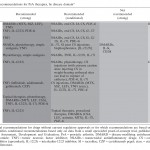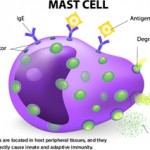Foot osteoarthritis (OA) of the first metatarsophalangeal (MTP) joint is thought to have biomechanical factors, but its treatments have not been comprehensively tested in clinical trials. In the first study to explore the efficacy of mechanical interventions, researchers compared the effectiveness of foot orthoses and rocker-sole footwear in reducing pain. Both interventions were effective, but the foot orthoses group wore the intervention for significantly more hours than the footwear group…

2015 Treatment Recommendations for Psoriatic Arthritis
Psoriatic arthritis (PsA) is remarkably diverse in presentation and course. To assist clinicians in its management, the Group for Research and Assessment of Psoriasis and Psoriatic Arthritis (GRAPPA) published treatment recommendations in 2009 based on a systematic evidence review. To be clinically relevant, such recommendations must be dynamic, and significant developments in PsA pathophysiology and disease assessment, particularly regarding the important contribution of comorbidities coupled with major therapeutic advances, necessitated an update of the GRAPPA recommendations…

The Microbiome in Pediatric Rheumatic Diseases
The human intestinal microbiota is home to more than 1,000 bacterial species, containing approximately 3 million genes, many of which code for functions that have the potential to affect human physiology.1 Smaller numbers of organisms are also present in the skin, upper gastrointestinal tract, female reproductive tract and the oro- and nasopharynx. As tools have…

Rheumatology Research Foundation Creates Five-Year Strategic Plan
Dramatic advancements in research toward prevention and cure are at risk, as federal research funding for rheumatic diseases has declined by 40% over the past five years. With that, an alarming number of rheumatologists are preparing for retirement. To stop this worrying trend, a strategic plan for the next five years was developed to complement…
The ACR Joins Call for Dedicated Arthritis Research Funding to Help Veterans
Arthritis is the primary cause of disability among U.S. military veterans and the second most common reason for medical discharge from the U.S. Army. One in three veterans is diagnosed with arthritis, compared with one in five members of the general U.S. population. It is important to keep in mind that these statistics reflect only…
The ACR, ARHP Develop National Research Agenda for 2016–2020
Since 2005, the ACR’s Committee on Research has been responsible for advancing the research goals of the organization and providing leadership in research and research training in rheumatology via the ACR’s Research Agenda. The ACR Research Agenda is designed to address critical areas of research in rheumatic diseases, including the need for new technology, new…

Research Provides Insight into Impact of Microbiome on Health, Rheumatic Disease
The microbiome comprises diverse microbial flora, including bacteria, viruses and fungi, that live on mucosal surfaces, predominantly the skin and digestive tract. Microbes evolved billions of years prior to the development of modern Homo sapiens 200,000 years ago; we have always existed with their ubiquitous presence. Despite this, the first microbe was not visualized until…

2015 ACR/ARHP Annual Meeting: Macrophage Polarization and Its Role in Inflammatory Disease
SAN FRANCISCO—To unravel how out-of-control inflammation begins in rheumatoid arthritis and other diseases, one target for immunologists is the macrophage. Researchers discussed macrophage activation and other key drivers of inflammation at the 2015 ACR/ARHP Annual Meeting on Nov. 7. How macrophages behave when recognizing damage-associated molecular pathways (DAMPs) tells us more about why some inflammation doesn’t…

2015 ACR/ARHP Annual Meeting: Cellular Triggers in Inflammatory Disease
SAN FRANCISCO—What factors help determine whether or not inflammation resolves, leading to healing, or becomes chronic, leading to disease and tissue destruction? A number of important cells, including toll-like receptors, mast cells, anti-citrullinated protein antibodies, complement and interferon, all play their own role in this process. By understanding how they act in innate and adaptive…

2015 ACR/ARHP Annual Meeting: Genetically Complex Auto-Inflammatory Diseases
SAN FRANCISCO—Early in his career, Daniel Kastner, MD, PhD, scientific director at the National Human Genome Research Institute, saw a 24-year-old patient with a lifelong history of recurrent fever and severe episodes of arthritis. A colleague told him it was most likely familial Mediterranean fever (FMF). There was little then known about its mechanisms, and…
- « Previous Page
- 1
- …
- 62
- 63
- 64
- 65
- 66
- …
- 130
- Next Page »